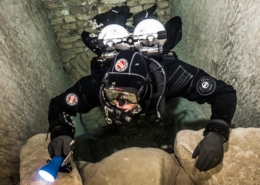What to Expect – Learning Agreements in Technical Training
By Brian Shreve
Sport diving specialty courses typically consist of two to three dives and expose divers to the basic concepts of a special type of diving. Most divers enter the realm of technical diving expecting tech diving courses to follow that same model and are often times both unprepared for and surprised by the chance they may not achieve certification in that course right away. The expectation of, “do a couple of dives, learn some basics, and get a card,” simply doesn’t hold up for technical diving. Technical diving courses carry with them access to additional dive sites and environments, deeper depths and longer in-water times. Along with that comes additional risk, so divers must be proficient at the skills in the course prior to achieving certification. To help clarify expectations, many technical instructors use a learning agreement of some kind.
What is a learning agreement?
A learning agreement is a document that specifies items that students should be aware of prior to starting their technical diving course. Common topics addressed include:
- General course expectations and equipment requirements
- Any additional fees
- What the instructor expects from the diver
- What the diver should expect from the instructor
- Inability to meet performance requirements
What do those topics cover?
By its nature, diving is an equipment-intensive activity — technical diving, even more so. By laying out the general flow of the course and specifying all required equipment, the learning agreement helps the student both understand course progression as well as arrive prepared for the course. Many pieces of kit that work fine for sport diving may be unsuited for technical diving, so most instructors will specify the sort of equipment required for the course as taught in their local environment. This section will also typically explain that the instructor has final say on the suitability of a particular piece of equipment.
Fees
Most technical diving course fees just cover the cost of instruction, and possibly course materials and certification fees. A learning agreement will spell out additional fees such as charter fees, park entrance fees and gas fills. By doing this, there are no unpleasant surprises for the diver when they show up at the dive site.
The meat of the learning agreement is typically spent on the next two topics. The instructor will explain his or her expectations for the diver in terms of physical fitness, mental preparedness, attention to detail, team, and self-awareness, punctuality and more. Likewise, the instructor will spell out to the student what they can expect from their instructor. Among these are professional behavior, punctuality, personal attention, fair treatment and an honest assessment of skill level. Most instructors will include any considerations unique to the local environment or to the training site if travel is involved.
Performance Requirements
Perhaps most importantly, the learning agreement will also cover what happens when a diver is unable to meet the performance requirements of the course to earn certification. The standards and procedures for the course list the bare minimum skills that must be mastered by the diver to graduate from the course and earn certification. Most technical instructors expect their students to perform above the bare minimum to graduate. This may seem unfair to divers in the course until they understand that the worst they do in practice is likely the best they’ll do on a dive when things go pear-shaped. Skills like buoyancy control, trim, team awareness, etc., need to be second nature when task loaded in order to successfully pass.
This section will also go over what the diver can expect if they don’t pass in the set schedule in terms of costs associated with extra dives. The divers are also expected to arrive to the course proficient in requisite skills from prerequisite courses, and this section will typically outline expectations and outcomes when divers are deficient in foundational skills. Depending on how the course is structured, course fees may be applied to remedial training, or the divers may just be out that money if they arrive unprepared.
By using a learning agreement, instructors help students understand all the above and more. Having the learning agreement in hand prior to the course start allows students to review their equipment and skill set to ascertain suitability with guidance from their instructor. Clearly stating expectations eliminates surprises for both parties. By explaining what happens if a student fails, it both brings the realization that the diver may not pass (usually a given with most sport diving specialty courses) as well as explain the process of remediation and additional training.
If you’re a diver interviewing instructors for a technical diving course, additional questions about the use of a learning agreement to your list. If you’re a technical instructor and don’t use a learning agreement, consider incorporating that into your pre-course paperwork. Years of using a learning agreement have shown them to be a very effective tool to manage expectations and eliminate surprises.









 Natalie L. Gibb
Natalie L. Gibb
發表評論
想加入討論?隨時歡迎參與討論!